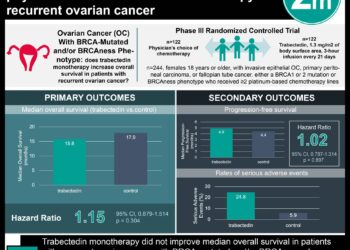DNA from tampons may be a sensitive test for high-grade ovarian cancer
1. In a small study of five women, vaginal DNA from tampons had a 60% sensitivity for detecting high-grade serous ovarian cancer in women with intact fallopian tubes.
Evidence Rating Level: 3 (Average)
Study Rundown: Ovarian cancer is the most deadly of all female cancers, killing an estimated 14 000 women in the United States last year alone. Symptoms of ovarian cancer are typically nonspecific, such as bloating or abdominal pain, and complicate early diagnosis. Unlike pap smears for cervical cancer, there is no effective screening test for ovarian cancer, so most women are diagnosed at a more advanced stage. Because the ovaries are connected to the uterus, cervix and vagina through the fallopian tubes, researchers hypothesized that cancer cells might exfoliate off ovarian tumors and be detected in cell samples from the vagina. To test this theory, they used tampons to collect vaginal cell samples from women undergoing surgery for ovarian masses and looked for TP53 gene mutations (found in most epithelial ovarian cancers) in the tampon samples of women with intact fallopian tubes, diagnosed with high-grade ovarian cancer.
In a small sample size of only five women, TP53 gene mutations were present in 3 tampon samples, giving the test a sensitivity of 60% for detecting high-grade ovarian cancer. Strengths of this study include its unique concept—if successful, this technology might offer non-invasive, early detection of ovarian cancer. Limitations include very small sample size and inclusion of only women with high-grade ovarian tumors. Further investigation to determine clinically utility in the general population, where the prevalence of ovarian cancer is very low, is merited.
Click to read the study in Obstetrics & Gynecology
Click to read an accompanying editorial in Obstetrics & Gynecology
Relevant Reading: Drive mutations in TP53 are ubiquitous in high-grade serous carcinoma of the ovary
In-Depth [pilot study]: Researchers enrolled 33 women undergoing surgery for a pelvic mass at a gynecologic oncology clinic. A vaginal tampon was placed prior to surgery and removed in the operating room. In women who were diagnosed with advanced serous carcinoma, DNA was extracted from both cells trapped in the tampon and the tumor and tested for a TP53 mutation. For DNA detection, researchers used a highly sensitive, novel method able to detect rare gene mutations in a mixed DNA sample.
Of the women originally enrolled, 8 were diagnosed with high-grade cancer; five had intact fallopian tubes and were included in the final analysis. TP53 mutations were detected in all tumor samples, and in the tampon samples from 3 of 5 participants, for a sensitivity of 60%. In all 3 cases of successful detection, the mutation identified from vaginal DNA was identical to that in the ovarian tumor.
More from this author: Contained morcellation for benign gynecologic surgeries feasible, minimize surgical risk, Oocyte vitrification not associated with adverse obstetric or perinatal outcomes, IUD contraception equally safe in teenagers as in older women, No-cost contraception reduces unintended pregnancy rates, 20% lifetime risk of pelvic floor surgery in women
Image: PD
©2012-2014 2minutemedicine.com. All rights reserved. No works may be reproduced without expressed written consent from 2minutemedicine.com. Disclaimer: We present factual information directly from peer reviewed medical journals. No post should be construed as medical advice and is not intended as such by the authors, editors, staff or by 2minutemedicine.com. PLEASE SEE A HEALTHCARE PROVIDER IN YOUR AREA IF YOU SEEK MEDICAL ADVICE OF ANY SORT.







